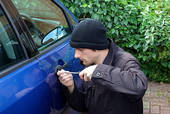 First the thief picks a location. A busy shopping centre is
not a good place. A deserted parking place outside town with
lots of escape routes is. When in a large car park, try to
park the car on the side. A thief is still protected by cars
on either side of your vehicle so try to make at least one
side visible to the public. Pick a path were many people
walk by, for example to the exit. First the thief picks a location. A busy shopping centre is
not a good place. A deserted parking place outside town with
lots of escape routes is. When in a large car park, try to
park the car on the side. A thief is still protected by cars
on either side of your vehicle so try to make at least one
side visible to the public. Pick a path were many people
walk by, for example to the exit.
Cars are picked by price and model. If you have a Mercedes
you certainly have money for a good stereo. If you have a
Fiat Uno you probably also have a budget radio. If you drive
an average car but it has light alloy wheels, extra
spoilers, a shiny exhaust or even worse stickers with the
make of your audio system you are an excellent target. Small
average looking cheap cars are not even looked at.
After the thief looks at the possible targets, he/she will
take a look inside the cars.
Professional burglars know what they are doing. They see the
difference between a fake alarm and a real one. They also
know that big subwoofers in the rear of your car mean that
there's got to be an amplifier in the car somewhere. Most of
them can even tell the exact make and model of your head
unit by the part that's still left after removing the
detachable face plate.
Less experienced thieves break in once or twice because they
need the money or because the see an easy target. They don't
know the difference between a Pine and Alpine unit.

Statistics show that detachable faceplates are the safest
option. Number two is the removable unit followed closely by
the key card system. As many people hide the detachable
faceplate in the glove compartment or the entire head unit
in the boot, cars will still get broken into. If possible
leave the glove compartment open when parking so everyone
can see there's nothing there.
How thieves break into your car
Breaking the window is the way to go in 50% of all cases,
the other way is forcing the lock. Sun roofs or hatches are
not a popular place to enter a car.
After taking out the head unit, the space under the seats
and the glove compartment will be entered. Then all possible
buttons and leavers will be tried to see if the boot will
open.
Alarm systems
An alarm system will shorten the time a thief
takes to grab your belongings. But the alarm has to be
installed well. If a kick on the dash or pulling some loose
wires is enough to shut up the system, it is a waste of
money and effort.
First thing is to get a good alarm system, Eurolock is
highly recommended.
Hide the central unit of the alarm system, preferably not
under the dash. Pick a strange place: under the back seat,
in the boot or under a front seat. It has to be impossible
to destroy the unit in a single hit for a panicking thief.
Better yet it has to be impossible to find the unit for
someone who stole the entire car. Therefore make sure you
hide the wiring as well. Run wires through the car's
standard harness.
Most VESA approved alarm
systems only use black wiring so a thief cannot hack the
alarm by cutting the right wire. The same goes for the siren
don't make them easily accessible.
Finally do not put stickers on the car showing the make of
the alarm, this will help experienced thieves to disarm your
alarm.
In these days with lots of break ins and many false alarms,
the system is mostly a signal for you. An alternative is
installing a siren inside the car. A 130-dB siren is so loud
in a little car interior that the thief can choose: harm the
ears for life or leave now.

To avoid false alarm make sure you can tap
with your hands on all windows without triggering the alarm.
Summary
· Park your car in a crowded place
· Park your car where everyone can see it (or rather: see
the thief)
· Park your car next to nicer looking car hoping that it
will be the victim instead
· Take your detachable faceplate with you!
· Install an alarm system, it will make your car less
attractive than cars without one
· Stickers showing the make of your alarm makes it easy for
thieves to eliminate the system
· Insure the car and the audio system |

